Face paint does expire. The shelf life is around 18 months to 3 years. Factors like brand and opening affect this. Signs of expiry are odd smell, color changes, or texture issues like drying out. Spoiled face paint can lead to skin irritation or infections. Store it in a cool, dry area away from sunlight. Keep containers tightly sealed. Dispose if it smells bad or changes greatly. Safety risks of expired face paint include bacteria growth. Ensuring proper disposal is key. For more details on extending face paint life and safety concerns, keep exploring.
Key Takeaways
- Face paint expires due to bacterial growth and degradation.
- Signs of expiration include odor, color changes, and texture alterations.
- Proper storage extends face paint life and maintains quality.
- Expired face paint can cause skin irritation and infections.
- Dispose of expired face paint to prevent health risks and skin issues.
Shelf Life of Face Paint
Face paint typically has a shelf life ranging from 18 months to 3 years, depending on factors like brand and whether it has been opened or not.
If you find that your face paint has expired or dried out, don't worry; there are alternatives you can consider. One option is to explore different brands that offer longer shelf lives or better quality products.
Another alternative is to create your own DIY face paint formulas. This can be a fun and creative way to guarantee you always have fresh face paint on hand. By mixing ingredients like cornstarch, face lotion, and food coloring, you can personalize your colors and textures to suit your needs. Just remember to test your DIY creations on a small patch of skin first to check for any adverse reactions.
With these face paint alternatives and DIY formulas, you can keep your face paint collection fresh and exciting for all your artistic endeavors.
Signs of Expired Face Paint
If your face paint emits a strange odor, it could indicate spoilage and potential bacterial growth. When face paint starts to deteriorate, changes in color may also be noticeable, signaling reduced effectiveness.
Keep an eye out for altered textures like drying out or becoming clumpy, as this could mean the face paint is past its prime. Additionally, if you spot any unusual appearances such as mold growth or ingredient separation, it's best to steer clear as these are clear indicators of contamination.
It's important to be cautious and attentive to any differences in how the face paint looks, smells, or applies compared to when it was fresh. If you suspect your face paint is expired, it's advisable to refrain from using it, as expired products can potentially cause skin irritation or infections.
Storage Tips for Face Paint

Consider the importance of maintaining proper storage conditions to guarantee the quality and longevity of your face paint. To make sure your face paint remains in top condition, follow these best practices for storage.
Store your face paint covered in a clean, dry, and dust-free area away from direct sunlight. Leaving the containers uncovered until they dry can help prevent moisture build-up, which may impact the paint's effectiveness. Proper storage conditions play a crucial role in preserving the quality of your face paint.
It's essential to store face paint in a suitable environment to prevent drying out or spoiling. Make sure to keep your face paint in a cool, dry place and tightly sealed when not in use to maintain its quality. By adhering to these maintenance tips, you can prolong the life of your face paint and ensure it's always ready for your next creative endeavor.
Extending the Life of Face Paint
How can you maximize the longevity of your face paint while maintaining its quality?
To extend the life of your face paint, consider preservation techniques like storing it in a cool, dry place. Extreme temperatures can degrade the quality of the paint, so it's important to avoid exposing it to such conditions. Additionally, keeping the face paint containers tightly sealed when not in use can prevent drying out and contamination, thereby prolonging freshness.
Using the face paint within the recommended time frames is also essential. This helps guarantee its effectiveness and prevents any potential issues that may arise from using expired products. Furthermore, following proper hygiene practices during application can contribute significantly to extending the life of your face paint.
Safety Concerns With Expired Face Paint

Expired face paint poses potential health risks due to harboring bacteria and contaminants, leading to skin irritation or infections. Using face paint past its expiration date can result in adverse skin reactions and other health risks.
The chemical breakdown in expired face paint may cause skin irritation, allergic responses, or even infections. Being cautious as expired face paint may exhibit changes in texture, color, or smell, signaling potential contamination.
Additionally, the effectiveness and pigmentation of expired face paint may diminish, resulting in an uneven or patchy application that could further irritate the skin. To prevent skin reactions and health risks, prioritizing safety by disposing of expired face paint is vital.
Disposing of Expired Face Paint
If you notice any unusual changes in the smell or appearance of your face paint, it's time to contemplate proper disposal methods to prevent potential skin reactions. Expired face paint should be discarded if it smells rancid or displays significant alterations in color, texture, or consistency. Bacteria may develop on expired face paint, potentially causing skin issues upon application. To prioritize safety, it's essential to dispose of old face paint promptly rather than risking adverse skin reactions.
When it comes to disposing of expired face paint, consider creative alternatives or upcycling options. You can repurpose the containers for storing non-toxic materials, use the dried-out paint for arts and crafts projects, or even create unique textures in mixed-media art. By exploring these creative avenues, you not only eliminate the risk of using expired face paint but also contribute to sustainable practices by giving new life to old products. Remember, proper disposal is key to maintaining a safe and effective cosmetic collection.
Frequently Asked Questions
What Happens if I Use Expired Face Paint?
Opting for fresh products is crucial to avoid potential reactions and risks when using expired face paint. Prioritize safety precautions, such as checking expiration dates, to prevent skin issues and consider alternative, non-expired options.
How Long Can You Keep Face Paint For?
You can keep face paint for up to a year after opening, longer for higher-quality brands. Store it in a cool, dry place in tightly sealed containers to extend its shelf life. Check for changes before using.
How Long Does Skin Paint Last?
Skin safety is essential when using face paint. Always check expiration dates and monitor changes like smell or texture. Proper storage and hygiene practices help prolong face paint's lifespan. Remember, expired products should be disposed of.
Does Halloween Makeup Expire?
Keep makeup properly in a cool, dry place. Guarantee costume safety by checking for changes in smell, color, or texture. Dispose of any Halloween makeup that seems off, even if not expired. Trust your instincts!
Conclusion
To sum up, face paint does expire. It's crucial to inspect for signs of expiration, appropriately store face paint, and follow safety guidelines to guarantee its longevity and safe use.
By being mindful of these factors, you can prolong the life of your face paint and avoid potential risks associated with using expired products. Remember to dispose of any expired face paint responsibly to prioritize safety and hygiene.
